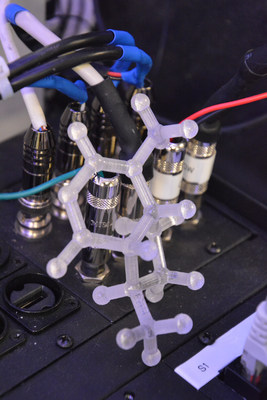NYU Researchers Pioneer Machine Learning to Speed Chemical Discoveries, Reduce Waste
BROOKLYN, N.Y., Dec. 13, 2018 /PRNewswire/ -- Machine learning algorithms can predict stock market fluctuations, control complex manufacturing processes, enable navigation for robots and driverless vehicles, and much more.

Now, researchers at the NYU Tandon School of Engineering are tapping a new set of capabilities in this field of artificial intelligence, combining artificial neural networks with infrared thermal imaging to control and interpret chemical reactions with precision and speed that far outpace conventional methods. More innovative still is the fact that this technique was developed and tested on novel microreactors that allow chemical discoveries to take place quickly and with far less environmental waste than standard large-scale reactions.
"This system can reduce the decision-making process about certain chemical manufacturing processes from one year to a matter of weeks, saving tons of chemical waste and energy in the process," said Ryan Hartman, an assistant professor of chemical and biomolecular engineering at NYU Tandon and lead author of a paper detailing the method in the journal Computers & Chemical Engineering.
Last year, Hartman introduced a new class of miniaturized chemical reactors that brings reactions traditionally carried out in large-batch reactors with up to 100 liters of chemicals down to the microscale, using just microliters of fluid ? a few small drops. These microfluidic reactors are useful for analyzing catalysts for manufacturing or discovering compounds and studying interactions in drug development, and they promise to reduce waste, speed innovation, and improve the safety of chemical research.
Hartman and his team have increased the utility of these reactors by pairing them with two additional technologies: infrared thermography, an imaging technique that captures a thermal map displaying changes in heat during a chemical reaction, and supervised machine learning, a discipline of artificial intelligence wherein an algorithm learns to interpret data based on inputs selected by researchers controlling the experiments.
Paired together, they allow researchers to capture changes in thermal energy during chemical reactions ? as indicated by color changes on the thermal image ? and to interpret these changes quickly. Due to the non-contact nature of infrared thermography, the technique can even be utilized for reactions that operate at extreme temperatures or in extreme conditions, such as a bioreactor that requires a sterile field.
The research team is the first to train an artificial neural network to control and interpret infrared thermal images of a thermoelectrically cooled microfluidic device. The potential impacts on both innovation and sustainability are significant. Large chemical companies may screen hundreds of catalysts while developing new polymers, for example, and each reaction can require more than 100 liters of chemicals and 24 hours or longer. Screening that number of catalysts using current laboratory processes can take a year. Using Hartman's approach, the entire process can be accomplished in weeks, with exponentially less waste and energy usage. Hartman estimates that a single industrial hood used to control fumes during large-scale chemical testing uses as much energy per year as the average U.S. home.
Along with Hartman, the research team includes NYU Tandon doctoral student Benjamin Rizkin and
18-year-old Karina Popovich, a Brooklyn Technical High School senior who joined Hartman's lab as part of InspirED, a National Science Foundation (NSF)-funded program that provides gifted juniors and seniors the opportunity to complete a thesis project in chemical engineering in Hartman's Flow Chemistry with Microsystems Laboratory.
A grant from the NSF also supported the team's research and enabled students in the laboratory to build the world's first artificially intelligent microreactor.
The paper, "Artificial Neural Network Control of Thermoelectrically-Cooled Microfluidics using Computer Vision based on IR Thermography," is available at https://www.sciencedirect.com/science/article/pii/S0098135418308184?via%3Dihub.
About the New York University Tandon School of Engineering
The NYU Tandon School of Engineering dates to 1854, the founding date for both the New York University School of Civil Engineering and Architecture and the Brooklyn Collegiate and Polytechnic Institute (widely known as Brooklyn Poly). A January 2014 merger created a comprehensive school of education and research in engineering and applied sciences, rooted in a tradition of invention and entrepreneurship and dedicated to furthering technology in service to society. In addition to its main location in Brooklyn, NYU Tandon collaborates with other schools within NYU, one of the country's foremost private research universities, and is closely connected to engineering programs at NYU Abu Dhabi and NYU Shanghai. It operates Future Labs focused on start-up businesses in downtown Manhattan and Brooklyn and an award-winning online graduate program. For more information, visit http://engineering.nyu.edu.
www.facebook.com/nyutandon
@NYUTandon
SOURCE NYU Tandon School of Engineering
These press releases may also interest you
|
News published on and distributed by:



